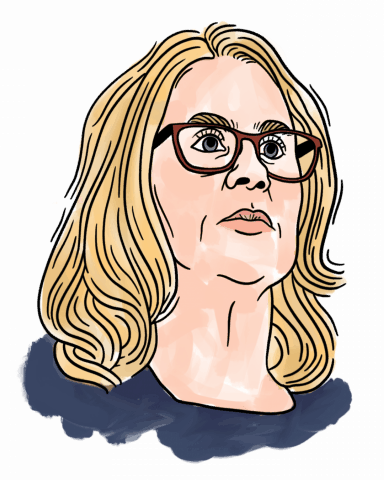On Sept. 27, 2018, when Dr. Christine Blasey Ford recounted, under oath, her past experiences with Brett Kavanaugh — newly confirmed as a U.S. Supreme Court Justice — many women empathized with Dr. Ford’s position. The chilling reality is that hers is a story that many women know well.
When I was 17, I went to a party at the house of an acquaintance. As my friends and I were getting ready to leave, one of the boys asked me to go talk with him in his car. We weren’t talking for very long before he tried to kiss me.
When I pushed him off of me, he reached over me and held the door closed. I remember the fear I felt in that moment very clearly, even two years later. I eventually managed to get out of the vehicle — I don’t know what would have happened if I had not.
When I told my friends about it later, one of them asked what else I expected from such an invitation. I know that she wasn’t trying to blame me, but her message was clear — I should have known better. But I didn’t — I only thought that someone who I considered a friend simply wanted to talk to me.
Now, years later, I know that what happened wasn’t right, but the event has stayed with me ever since. I never realized how much I had been affected by my experience, however, until I watched Kavanaugh’s hearing.
I always thought that I was overreacting about what had occured in that car. I tried to convince myself that nothing had really happened to me, and then I realized, during Dr. Ford’s testimony and through the subsequent discourse surrounding it, that there are people who would ask her to do the same, and that suddenly didn’t feel right.
Watching her testimony, it seems undeniable that she experienced the trauma she speaks to, and yet, there were still questions about her credibility. We are told that we aren’t supposed to talk about the event — we aren’t supposed to acknowledge it because it could threaten both the perpetrator’s future and our own. In acknowledging Dr. Ford’s bravery as she revealed her real, raw story on a national and international stage, we can begin to make change.
Some people may feel that Dr. Ford’s timing in coming forward with her accusations against Kavanaugh was suspicious, but it was both timely and poignant. I never imagined myself telling my own story, but I know I would speak out if the man who assaulted me was about to be placed in a position of authority such as Kavanaugh’s.
Dr. Ford didn’t tell her story because she wanted revenge. She did it in an effort to both protect the women of her country and empower all women to tell their stories, and her actions, I believe, are heroic. Choosing not to come forward undoubtedly would have been easier.
Appearing before the Senate Judiciary Committee and reopening old wounds has likely caused new pain and suffering for Dr. Ford and her family. However, had she told her story earlier, it likely would not have garnered the same kind of media attention nor been able to provoke the same level of emotion from the American public that it has since.
It is likely that Kavanaugh would not have faced any repercussions at all had Dr. Ford come forward with her accusations 36 years ago when she says that the traumatic interaction took place.
The particular timing of Dr. Ford’s testimony brought awareness of abusers creeping their way into the political realm and other positions of power and authority. As horrible as the circumstances were, her timing is so important.
Coming forward with our testimonies is how we can make change, and hopefully, make the world better for all survivors of sexual violence, assault and harassment. Although Kavanaugh was ultimately confirmed, it seems that most survivors and allies like me are enraged. If we can harness this emotion, maybe we can make a difference.
Our southern neighbours are expected to vote in the midterm elections on Nov. 6, and there is not a doubt in my mind that a powerful wave of voters will turn out to the polls. We are all ready for change and ready to create something better. Every fire needs a spark, and it feels as though Dr. Ford has ignited something within us.
—
Amber Jackson
Graphic: Jaymie Stachyruk / Graphics Editor